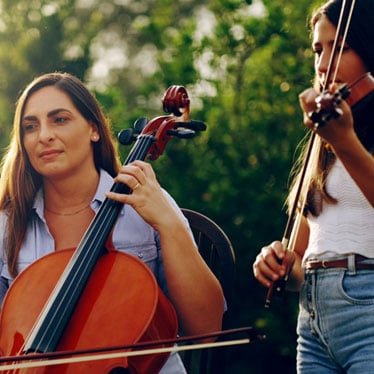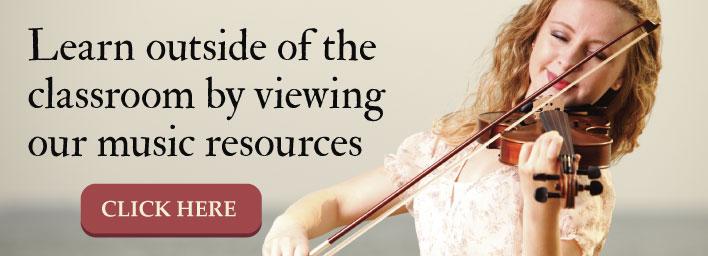How to Choose a Practice Partner

There's no one, straight path to achieve technical proficiency and artistry with your instrument. Throughout your personal and, hopefully, professional development as a musician, you want to work with a variety of different people in different capacities. Working with practice partners is one of those paths that allow you to explore and grow in unexpected ways.
Having a practice partner also helps you instill a mechanism for holding yourself accountable for doing your work and focusing on your goals. Having a good practice partner is also fun. Jamming out during some practice sessions helps keep both of you in touch with why playing the violin (or cello or whatever your instrument) is so much damn fun.
How to find a practice partner
If you're attending a music school or the music department at a university, you have a plethora of options. Indeed, your music school probably has a number of its own channels to help students find other students to pair up with. You can explore the official channels, but don't be shy about using social media or the local music scene to broaden your search. It can be anything from an old-school note posted to a community board at a local live music venue to digital posting a call for a practice partner on Instagram.
Make sure your practice partner request is specific:
- Share your skill level and instrument
- Clarify if you're looking for someone who plays the same instrument or another one
- How often do you want to practice together, when, and where (generally speaking)
- What are your general goals for the paired up practice sessions
The more specific you are in your notice, the higher quality responses you'll receive. However, don't be overly demanding or you'll turn people off. Paired-up practicing is for the mutual benefit of both partners. It's not all about you.
Last, don't assume you need to be the poster. Start by checking out the right hashtags, ad spaces, and other ways people search for practice partners. You might find an ad of someone looking for you!
What qualities will make a practice partner useful for you?
Before reading through or posting ads for a practice partner, clarify what you need and what you offer.
For example, it's helpful that both musicians are at a similar skill level. If one partner is far more advanced, there's a risk the practice sessions will turn into tutoring sessions. That's not fair for the more advanced partner. Instead, get specific about your strengths and weaknesses, so you know where you can assist a partner and what assistance you'd like in return. You may have strong bow technique but have challenges producing the right pitch and harmonies. A practice partner with strong skills in those areas could be a good partner for you. The two of you can share a skill level while facing different challenges. Do you need someone who just loves doing scales to get you to do yours? That may be something to look for in your practice partner.
Commitment is another critical point of compatibility to find in a practice partner. Someone who's only looking for a relaxed jam session isn't going to be a good partner for you if your practice goals are more formal and serious.
Similar to commitment is the issue of whether you share similar practice goals. If you're looking for a practice partner to assist with your coursework, then selecting someone taking the same course seems an obvious choice. If your goal is artistic development, you may want to look for someone outside your immediate conservatory circle.
How to vet a potential practice partner?
We've all learned, as early as grade school, to be wary of the overly eager fast friend who jumps on you before you've had a chance to sit down the first day of class. It's a good lesson. Don't commit too soon to anyone. Assuming you've done your homework to identify what you want in a practice partner, now you can start actually considering people.
Whether your potential partner is a classmate or someone from outside the school, it's worth your time to get to know them a bit before committing to a practice schedule. Talking via Facetime or Messenger or a public café is always a good option. If they are a student at the same school, meet on campus. Fortunately, social media helps you learn about people before you bring them into your circle. Does it look like their musical history comports with what they've told you?
If you seem compatible, you might suggest the two of you have one or two practice sessions, just to try things out. As long as you frame it as the opportunity for you both to test out whether you're mutually compatible (remember – you might not be the right partner for them!), nobody should get offended.
Using the practice partner search process to expand your circle
As you go through your search and vetting process, don't dismiss people who may not be the perfect practice partner for you right now. This process itself is a great way to expand your musical network. People who don't match up as a practice partner could be great people for exploring other artistic and performing opportunities.


